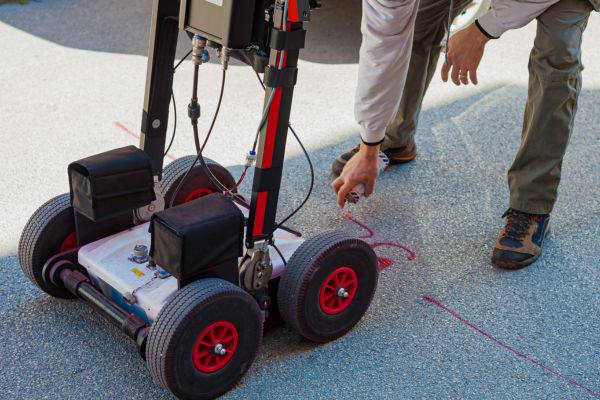
- Details
- By Darren Thompson
On August 14, the Lac du Flambeau Band of Lake Superior Chippewa Indians announced in a press release that it is currently investigating suspicions of tribal burial sites at a church property on the reservation.
The tribe said that early last month, its Tribal Historic Preservation Office (THPO) conducted a Ground Penetrating Radar (GPR) survey with the Ho-Chunk Nation of Wisconsin’s THPO at the Community Presbyterian Church in Lac du Flambeau, Wisconsin.
“The survey was initiated after the discovery of a depression on a section of the parking lot’s main surface,” the Lac du Flambeau THPO said in a press release on Monday. “The survey, completed earlier last month, provided some indication that further examination will be necessary in the coming weeks, to determine if there is a presence of tribal burial sites on this property.”
According to the Community Presbyterian Church, Rev. Francis Spees established the Presbyterian mission in 1872, in an effort to convert local Ojibwe people. The church’s website says that the Lac du Flambeau tribe generously set aside land for the church, which allowed the construction of the original church sanctuary in 1898. The congregation was formally organized on May 13, 1924.
The Tribe announced that it expects to begin preliminary digging activities at the Community Presbyterian Church during the week of August 21. “The focus will initially begin at one or both locations where GPR data has indicated the potential existence of human remains,” the Lac du Flambeau Band of Lake Superior Chippewa Indians said in a statement. “If the Tribe determines that there is evidence of human remains, they will remain untouched in the ground. They will not be exhumed.”
Any areas identified as burial or grave sites will impact the Community Presbyterian Church, including its parking lot. If burial sites are found, they would be reclaimed by the Tribe. “At this time, it is too early to make any substantive comments on how this process will affect the Church parking lot,” the Tribe said.
The Tribe said that the Presbyterian Church has been very cooperative throughout the GPR survey process and will continue to accommodate the Tribe’s efforts to conduct a thorough study of the property.
“We are always assessing and reviewing other areas of concern and interest and will address those on a case by case basis,” a spokesperson for the Lac du Flambeau Band of Lake Superior Chippewa Native News Online.
The church property has been surveyed in the past, said Rober, but the parking lot is the only area that has been surveyed by a ground penetrating radar.
Last fall, Ho-Chunk Nation THPO Bill Quakenbush participated in the recovery of a 3,000 year old dugout canoe in Madison, Wisconsin. Quakenbush was unable to provide a comment before publication.
There are three organized churches that have property on the Lac du Flambeau Indian Reservation—the Community Presbyterian Church of Lac du Flambeau, Saint Anthony’s Catholic Church, and the Lac du Flambeau Bible Baptist Church.
More Stories Like This
NCAI Passes Two Emergency Resolutions on Immigration Enforcement ActivitiesChickasaw Lighthorse Police Officer named Indian Country Law Enforcement Officer of the Year
Indian Gaming Association Rallies Broad Coalition Against Sports Event Contracts It Calls Illegal Threat to Tribal Sovereignty
Navajo Resources and Development Committee Issues Notice on Livestock Inspection Requirements
American Prairie, Tribal Coalition Files Protest Over Rescinded Grazing Rights
Help us defend tribal sovereignty.
At Native News Online, our mission is rooted in telling the stories that strengthen sovereignty and uplift Indigenous voices — not just at year’s end, but every single day.
Because of your generosity last year, we were able to keep our reporters on the ground in tribal communities, at national gatherings and in the halls of Congress — covering the issues that matter most to Indian Country: sovereignty, culture, education, health and economic opportunity.
That support sustained us through a tough year in 2025. Now, as we look to the year ahead, we need your help right now to ensure warrior journalism remains strong — reporting that defends tribal sovereignty, amplifies Native truth, and holds power accountable.
 The stakes couldn't be higher. Your support keeps Native voices heard, Native stories told and Native sovereignty defended.
The stakes couldn't be higher. Your support keeps Native voices heard, Native stories told and Native sovereignty defended.
Stand with Warrior Journalism today.
Levi Rickert (Potawatomi), Editor & Publisher

